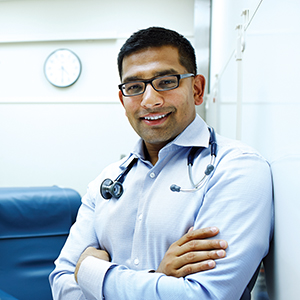Feature: Driving randomized trials for global impact
By Emily Leighton, MA'13
Large-scale randomized trials are considered the gold standard of evidence in modern health care – but the journey from trial design to completion is extremely complex, time consuming and expensive.
From protocols to data collection to the regulatory landscape, the process is onerous and often inaccessible for individual researchers.
Recognizing these barriers, Dr. Amit Garg, Associate Dean, Clinical Research, is spearheading an initiative to drive more randomized trials at Schulich Medicine & Dentistry and Western University, elevating the capacity to develop and lead trials that directly influence health care.
“We are embracing new innovations in trial execution, and we think this will be a game-changing initiative,” he said. “We’re confident that in a decade, we will achieve something wonderful for the University and the broader trials community with this enabler of high-quality research and impact."
The purpose of the new initiative, a goal in Schulich Medicine & Dentistry’s five-year Strategic Plan, is to support and enable researchers in conducting randomized trials.
 “We want to provide the resources to help faculty members conduct trials in a more efficient and effective way, with bigger impact,” said Garg. “These trials will test scalable and sustainable solutions to improve health and health care.”
“We want to provide the resources to help faculty members conduct trials in a more efficient and effective way, with bigger impact,” said Garg. “These trials will test scalable and sustainable solutions to improve health and health care.”
Garg and his team are focused on launching one arm of the trial initiative called S5 – supporting researchers to conduct streamlined trials, testing solutions which are simple, scalable, and sustainable. Streamlined, large pragmatic randomized trials typically test a low-risk solution with an efficient approach to patient consent. The promising solution is delivered in routine care without research coordinators, and existing data sources, such as large health care administrative databases, are leveraged for the trial needs to minimize the need for additional data collection.
“The S5 component of our trial initiative will help faculty test promising interventions which already exist in health care or ideas that are easy to implement and expand worldwide,” explained Garg. “It’s meant to bring the right people and resources together to help faculty members achieve and implement their ideas, in a way they could not do on their own.”
“This is where we, as a local research community, have a competitive advantage,” he added.
Researchers will receive support with developing protocols and methodology, streamlining ethical approaches, leveraging existing data sources and data management.
Garg has been working with closely with advisors from partner faculties at Western, as well as ICES Western, AMOSO, Lawson Health Research Institute and London’s hospitals.
“The partners are working together to ensure a positive, streamlined experience which will enable researchers to go further and faster in what they want to achieve,” he said.
A launch event for the S5 component of the trial initiative is taking place on April 30 to provide more information and an opportunity for researchers to connect. The workshop includes presentations from researchers and a panel discussion about experiences with new innovations in trial execution.
In addition to the S5 platform, the randomized trials initiative will also support researchers with first-to-human trials. Garg anticipates working with stakeholders to build a plan for this component of the initiative by the end of the 2022 calendar year.
He is also working on funding mechanisms to support proposal development and new projects.
Before taking on the Associate Dean role in October 2021, Garg served as special advisor to the Dean on clinical research, working with a variety of stakeholders and completing detailed environmental scans. A renowned nephrologist and clinician-scientist, his own research has made a substantial impact on patients with kidney disease. He has also served the research community as the Director of ICES Western during the past decade, a core facility that has enabled the research of multiple scholars in the region.
“It is important that we do not conduct research in a bubble, but with patients, health care administrators, scientists, and health professionals as full partners,” he said. “We build consensus on the most important areas to study and improve, and then research them effectively for the biggest impact possible.”
For Garg, the long-term vision for the randomized trials initiative is to establish a strong international reputation at the School and University, producing research with global impact.
“What we would like to realize in the next decade is that we’ve enabled faculty to efficiently conduct and execute high-quality trials, and the trial results are well-received by experts and top health care journals,” he said. “Ultimately, our goal is for trial-proven beneficial treatments and solutions to be used broadly to improve human health.”










